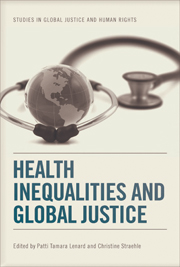Book contents
- Frontmatter
- Contents
- Acknowledgements
- Notes on the Contributors
- Introduction: Health Inequality and Global Redistributive Justice
- Part 1 A Right to Equal Health?
- Part 2 Who is Responsible for Remedying Global Health Inequality?
- Part 3 Measuring Health and Health Outcomes
- Part 4 Borders and Health
- 11 Justice and Health Inequalities in Humanitarian Crises: Structured Health Vulnerabilities and Natural Disasters
- 12 ‘Illegal’ Migrants and Access to Public Health: A Human Rights Approach
- 13 Medical Migration between the Human Right to Health and Freedom of Movement
- 14 Healthcare Migration, Vulnerability and Individual Autonomy: The Case of Malawi
- Bibliography
- Index
14 - Healthcare Migration, Vulnerability and Individual Autonomy: The Case of Malawi
from Part 4 - Borders and Health
Published online by Cambridge University Press: 05 August 2013
- Frontmatter
- Contents
- Acknowledgements
- Notes on the Contributors
- Introduction: Health Inequality and Global Redistributive Justice
- Part 1 A Right to Equal Health?
- Part 2 Who is Responsible for Remedying Global Health Inequality?
- Part 3 Measuring Health and Health Outcomes
- Part 4 Borders and Health
- 11 Justice and Health Inequalities in Humanitarian Crises: Structured Health Vulnerabilities and Natural Disasters
- 12 ‘Illegal’ Migrants and Access to Public Health: A Human Rights Approach
- 13 Medical Migration between the Human Right to Health and Freedom of Movement
- 14 Healthcare Migration, Vulnerability and Individual Autonomy: The Case of Malawi
- Bibliography
- Index
Summary
Few would argue that access to healthcare is equitably distributed around the globe. Most would instead agree that living in a developed country gives a person more extensive access to healthcare than citizens of developing countries have. The definition of access to healthcare I want to employ here is that a person has access to a health professional like a physician, nurse or midwife when they need to, and that the health professional is able to provide minimal prevention, education and treatment to them. One of the aggravating factors given for inequality in access to healthcare is the unequal distribution of healthcare professionals, very often heightened by migration of healthcare professionals from developing countries to developed countries. Many nurses and doctors from what we may call health provision poor countries choose to migrate to other countries to provide services and employ their skills there. This has led to a critical undersupply of doctors and nurses in their source countries, a situation defined by the WHO as less than 2.28 health-workers per 1,000 population, and less than 1.71 nurses per 1,000 (WHO 2009: 15).
In response to detrimental outmigration of health professionals, some have argued that developing source countries should be permitted to at least impose conditions on outmigration by healthcare professionals. The hope is that sending societies will thus be able to recoup some of the costs and burdens they have incurred in training doctors and nurses.
- Type
- Chapter
- Information
- Health Inequalities and Global Justice , pp. 247 - 264Publisher: Edinburgh University PressPrint publication year: 2012



